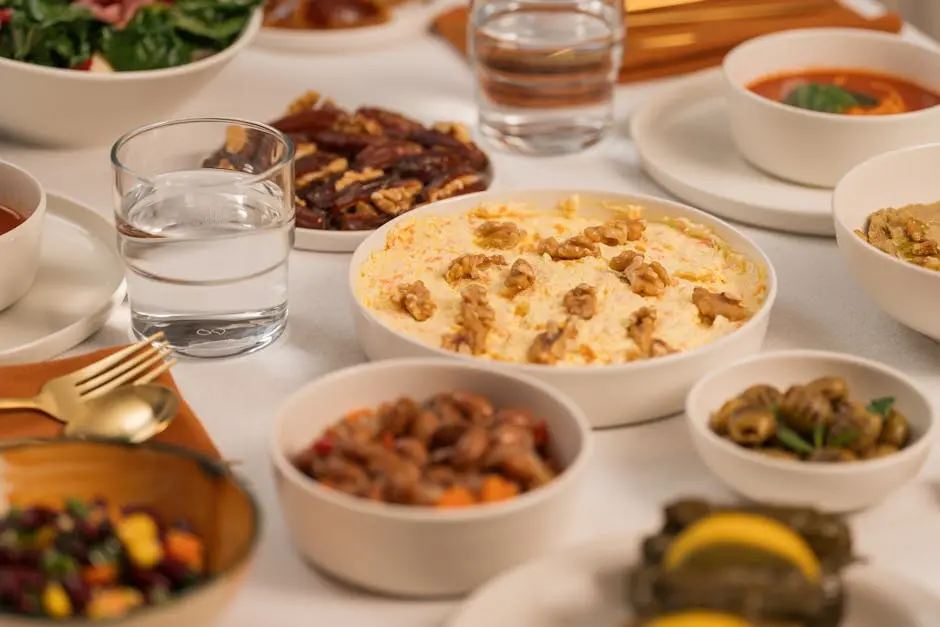Ramadan is a time of reflection, prayer, and fasting. As you embark on this spiritual journey, maintaining a healthy diet is essential to keep your energy levels up and make the most of the holy month. Here are some practical tips to guide you through a healthy Ramadan.
1. Choose Nutrient-Rich Foods for Suhoor
Start your fasting day on the right foot by making nutrient-rich choices for Suhoor. Include complex carbohydrates, proteins, and healthy fats to keep you full and energized throughout the day. Consider integrating foods like oats, nuts, and yogurt which are rich in essential nutrients and release energy slowly. This sensible approach helps keep you feeling satiated and prevents energy crashes later in the day. Additionally, a balanced Suhoor aids in maintaining stable blood sugar levels which is crucial during fasting periods.
Incorporate hydration-focused foods like watermelon, which not only add variety to your meal but also offer hydration, which is vital given the fasting conditions. Also, depending on your taste preference, adding a slice of whole grain toast with avocados or hummus can provide essential fiber and healthy fats. Fiber-rich foods like these are integral to aiding digestion and promoting a healthy gut over the course of Ramadan.
2. Stay Hydrated During Non-Fasting Hours
Water is your best companion during Ramadan. Ensure to drink plenty of water and incorporate hydrating foods such as fruits and vegetables into your diet during the non-fasting hours. Drinking water not only helps in preventing dehydration but also aids in keeping your body’s systems running smoothly. It’s recommended to drink at least 10 glasses of water between Iftar and Suhoor, allowing you to stay well-hydrated during Ramadan.
Avoid caffeinated drinks such as coffee and cola that can cause dehydration by increasing urination. Instead, opt for natural juices or infused water with a hint of citrus to amplify flavor without compromising hydration. Maintaining proper hydration levels is crucial not only for physical health but also for mental clarity and maintaining focus during this spiritually enriching period.
3. Prioritize Whole Grains
Whole grains are a great source of energy and can aid digestion. Opt for whole grain bread, brown rice, and oats to keep your body fueled longer. During Ramadan, these ingredients can be incorporated into your meals during both Suhoor and Iftar to ensure prolonged energy release throughout the night and into the following day’s fast. Whole grains are also packed with essential nutrients like magnesium and iron, promoting overall health.
These grains provide needed fiber that assists in maintaining a healthy digestive tract, especially important when meal timing changes so dramatically. Experiment with recipes such as stuffed whole grain pita at Iftar or a wholesome brown rice quinoa salad. Versatile and satiating, they serve as an excellent base for nutrient-dense meals that keep your energy levels stable.
4. Include Lean Proteins
Protein is essential for muscle repair and growth. Choose lean sources such as chicken, fish, and legumes to support your body’s needs. By choosing to incorporate these lean proteins into your meal plans, you foster muscle retention and growth even while fasting. This is particularly important for those wishing to maintain physical activity levels throughout Ramadan. Baking or grilling these protein sources keeps the dish low in unhealthy fats.
Consider plant-based protein options like lentils and chickpeas, integral for those who may not consume meat as part of their regular diet. Beans and legumes are not only high in protein but also contain fiber, keeping you feeling full and satisfied. Try incorporating a chickpea or lentil salad with vegetables, offering a nutritious punch to your Iftar meal.
5. Make Fruits and Vegetables a Staple
Fruits and vegetables provide essential vitamins, minerals, and antioxidants. Make sure to include a variety of colors in your meals for a diverse range of nutrients. Vegetables like spinach, carrots, and peppers add vibrant color and significant nutritional value, inspiring more engaging and wholesome meals while breaking fast.
Ideally, you should aim to incorporate fruits that have a high-water content like oranges or cucumbers, boosting hydration levels while delivering refreshing sweetness naturally, avoiding artificial sugars. Snacking on seasonal fruits such as melons and berries between Iftar and Suhoor can help curb those mid-night hunger pangs while nourishing your body.
6. Limit Processed and Sugary Foods
While it may be tempting, try to limit your intake of processed and sugary foods. These can lead to energy crashes and are not the best for maintaining stable energy levels. Processed foods often contain hidden sugars and unhealthy fats which make them less ideal for a sustained diet plan during Ramadan. Instead, focus on homemade treats like dates and nuts or a grain-based dessert for that hint of sweetness without overloading on sugar.
Creating healthy versions of popular Ramadan sweets with natural sweeteners like honey or maple syrup can still satisfy that sweet craving. Reducing the overall intake of added sugars not only benefits your health during fasting but sets a precedent for healthier eating patterns even post-Ramadan.
7. Practice Mindful Eating at Iftar
Breaking your fast is a time of joy and gratitude. Eat slowly and mindfully, savoring each bite, to avoid overeating and ensure your body digests food well. Starting with light options, such as a small bowl of soup or salad, is an excellent way to prime your stomach for digestion before indulging in larger portions.
Traditionally, it’s beneficial to begin Iftar with dates, a custom laden with benefits. Dates are rich in fiber and natural sugars that help boost energy levels quickly and assist in gently easing your digestive system into activity. Take time with your meal, letting your body signal full capacity, lest you risk discomfort from overindulgence.
8. Incorporate Healthy Fats
Healthy fats from sources like avocados, olive oil, and nuts are crucial for absorbing certain vitamins and supporting cell growth. These fats differ from the trans fats found in processed foods and offer benefits like reducing bad cholesterol levels and supporting heart health, which is particularly helpful during the fasting period. Consider drizzling some olive oil over salads or adding a slice of avocado to sandwiches to maintain a balanced intake.
9. Balance Macronutrients
A balanced meal includes a mix of carbohydrates, proteins, and fats. Plan your meals to cover all these macronutrients for a sustained energy release. Once you familiarize yourself with your body’s reactions, it becomes easier to create meals that meet your nutritional needs. For instance, combining complex carbohydrates with protein during Suhoor ensures energy while incorporating healthy fats into Iftar can aid in efficient digestion.
Mixing different food groups not only satisfies hunger but promotes the holistic nutrient intake necessary for maintaining health. Adopting a holistic approach to meal planning enriches dietary diversity and encourages cooking creativity.
10. Listen to Your Body
Your body knows what it needs. Pay attention to hunger cues and adjust your diet accordingly, ensuring that you give it the necessary nutrients and energy during Ramadan. When experiencing symptoms of fatigue or dizziness, sit and rest, opting for gentle hydration and a light snack to realign your energy levels.
This insight fosters an intuitive approach towards eating, where understanding and appreciating your body’s signals form the crux of maintaining healthful fasting practices. Opt for flexibility within your plan, accounting for times when rest outshines a mid-day activity or when a snack defeats a scheduled meal.











